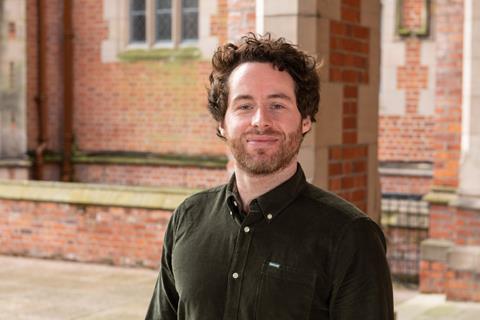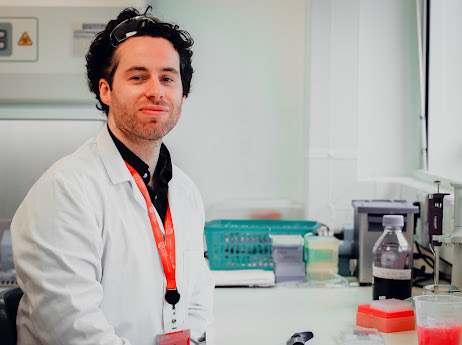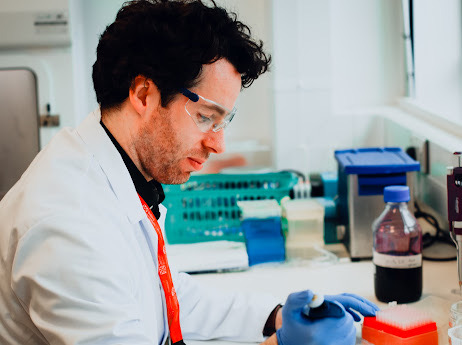Dr Thomas Thompson of Queen’s University Belfast in Northern Ireland has been named as this year’s winner of the inaugural John Snow Prize for microbiology.

The prize is part of the Applied Microbiology International Horizon Awards, which celebrate the brightest minds in the field and promote the research, group, projects, products and individuals who continue to help shape the future of applied microbiology.
The prestigious scientific prize is awarded to a scientist who has made a significant contribution to the expansive field of clean water and sanitation, such as the management of surface and groundwater contamination or human exposure to pathogens.
Prestigious event
Dr Thompson was named as winner of the prize at the prestigious EMI lecture 2023, held at BMA House in London on November 16.
His research investigates the role of cold atmospheric pressure plasma to enhance antibiotic effectiveness against bacterial biofilms, offering a potential solution to antimicrobial resistance, and includes utilising cold plasma to degrading antibiotic residues in wastewater, improving water quality and sanitation.
Part of Thomas’s work also employs bioinformatics to understand bacterial stress responses in infections. Through this research he addresses broader global health and environmental challenges, intertwining cold plasma technology with antimicrobial resistance, water purification, and bacterial biofilm prevention/treatment.
Early curiosity
Born in Derry, Dr Thompson says it was at St Columb’s College that he was inspired to delve deeper into science.
“Biology made me curious about the natural world, and chemistry helped me make sense of it. I chose to study Pharmacy at Queen’s University Belfast and initially, I was keen on learning more about plants and how they could help us combat diseases,” he said.

“I got lucky when I had the chance to do a summer studentship in Prof Brendan Gilmore’s lab, and that’s where we explored the antimicrobial potential of algae against superbugs like MRSA - it was a project that really got me passionate about microbiology.
“Even though I later qualified as a pharmacist and continue to work as one, I knew that microbiology was where my passion truly lay and so I went back to Queen’s and completed my PhD. The importance of microbiology in the natural world, its role in antibiotic resistance, and even within our own microbiome were all areas that fascinated me.”
Cold plasma
Following his PhD, he started working as a postdoc, exploring the role of cold plasma in applied microbiology.
“This project has been so rewarding, and I’ve been lucky to work with a team of PhD students and academic staff across the world,” Dr Thompson said.
“It was through this research that we discovered the amazing potential of using cold plasma to improve water quality, both chemically and biologically. Our exploration into cold plasma has just begun and there’s so much more we are eager to uncover.

“The John Snow Prize resonates with my endeavours, aligning closely with UN SDG 6 – Clean Water and Sanitation. This journey, seeded in Derry, nurtured at Queen’s, and now echoing on the global stage, epitomises the essence of the Horizon Awards - pushing the boundaries of applied microbiology towards a sustainable future.”
Father of modern epidemiology
The John Snow Prize is named after an English physician who was widely viewed as the father of modern epidemiology because of his ground-breaking studies of cholera. During the second cholera epidemic in London in 1848–49, Snow together with other British physicians founded the London Epidemiological Society to advise the government on ways to combat the recurrent epidemics.
Using a scientific methodology he was able to trace the source of the third cholera outbreak in 1854 to the Broad Street pump in Soho. His second major contribution was with his ‘Grand Experiment’, which lasted until 1855, in which he demonstrated the harmful effect of contaminated water by comparing waterborne cholera in London neighbourhoods receiving sewage-contaminated water as opposed to those receiving relatively clean water coming from upper River Thames away from urban pollution.
To find out more about AMI’s Grants and Awards programme, visit https://appliedmicrobiology.org/membership-community/grants-awards.html
Topics
- Antimicrobial Resistance
- Applied Microbiology International
- Applied Microbiology International Horizon Awards
- Biofilms
- Brendan Gilmore
- cholera
- Clean Water
- cold plasma
- Community
- Early Career Research
- John Snow Prize
- People News
- Queen’s University Belfast
- Sample preparation, filtration, detection and treatment techniques for water-borne pathogens
- Thomas Thompson
- UK & Rest of Europe
- Wastewater & Sanitation







No comments yet